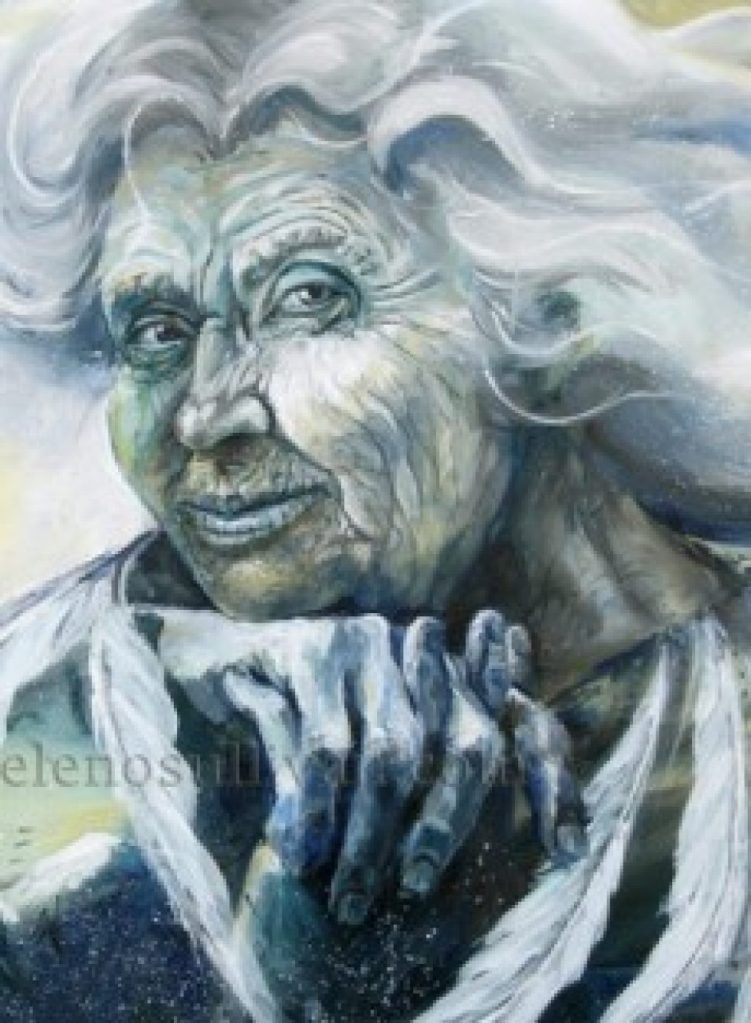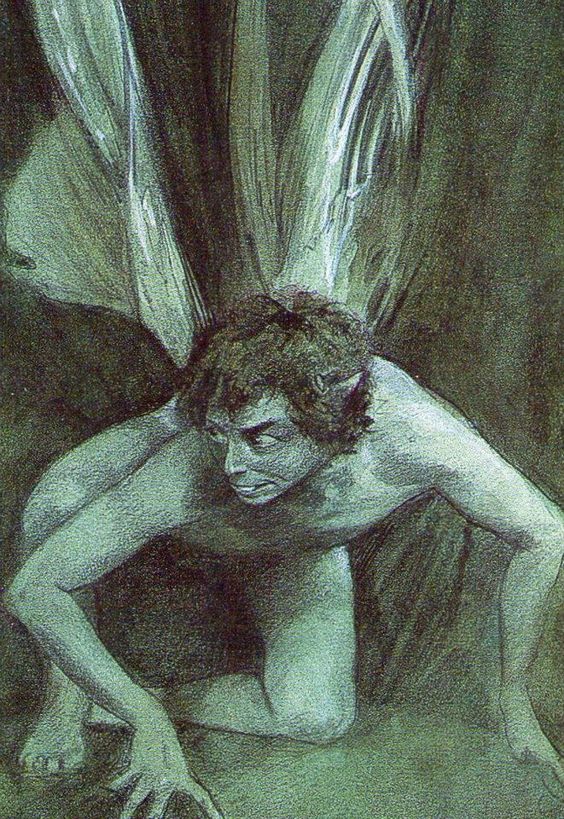“Fairy Preventions”

One old remedy for protecting a home against the ‘Good People’ is, immediately after sunset, to lock every door and window in the house and light a great turf fire in the hearth, into which you place nine irons. As these irons become heated a great noise will be heard from outside the house that are the cries of a witch trying to gain entry, begging and shrieking in pain to remove the irons from the fire, for they were burning her. When the witch finds that all her entreaties are useless, she will return to her home, shrieking, and bring back all the butter that she had previously taken. It is only then that the irons should be removed from the fire and thereby cease her torment. From that moment the farmer shall be able to enjoy the quality of his butter production and relish its undiminished quality.
It has been a long-held tradition in Ireland that a good and careful housewife should always leave a large container full of good drinking water in the kitchen before going to bed for the night. Folklore tells that one night a woman was suddenly awakened during the night by a great noise coming from the kitchen. When she went into her kitchen the woman found a crowd of the ‘fairy folk’ busying themselves cooking food on the fire or preparing the food for a feast. When they saw the woman of the house, ‘the good people’ warned her to go back to bed and she very wisely obeyed their command. When she arose the next morning the woman found that everything in the kitchen appeared to be undisturbed, except the large container that she had used for holding drinking water. The container was now full of blood, which was a hint to the woman that she should leave plenty of pure spring water for the self-invited guests.
Another story tells us that one night, in a remote cabin that sat in a wild and mountainous district of the country, many years ago, two hard-working women busied themselves spinning flax. In the silence of the night their work was suddenly disturbed by a loud knocking at the cabin door. Frightened by the unexpected noise the two women kept quiet until they heard a shrill voice ask, in Irish, “Are you within, feet-water?“
“I am,” a voice replied from within a pot that stood in the corner of the kitchen in which the family washed their feet before going to bed. There was a sound of splashing water, and an eel-like shaped creature rose up from the pot and, stretching forward, the door was unlocked door. From the night several small women of extraordinary appearance, and dressed in strange clothes, entered the cabin, and immediately began to use the spinning-wheel.
One of the women of the house, saying that she needed to fetch turf for the fire, went outside but immediately rushed back into the cabin shouting, “The mountain is on fire!“
Shrieking loudly, the uninvited strangers immediately ran out of the house exclaiming, ” My husband and my children are burnt.” Seeing that their trick had succeeded the women of the house lost not a moment in resorting to the usual precautions against fairy influence. When they closed the door, they made it more secure with iron tongs, laid a broom against the door, threw a glowing ember from the hearth into the “feet water,” plucked a quill from the wing of a speckled hen, removed the band from the spinning-wheel, placed the carded flax under a weight, and made up the fire. They had scarcely returned to their bed when the mysterious visitors were heard outside again calling in Irish as before, ” Let me in, feet-water.” But this time, the pot answered them, “No, I cannot, for there is a spark in me.” The fairy women then called upon all the other objects in the cabin, one after another, “Let me in, tongs;” “Let me in, broom;” “Let me in, speckled hen;” “Let me in, wheel-band;” “Let me in, carded flax.” Each object replied that it was powerless to obey, owing to the precautions which had been taken. The fairies thereupon raised an angry yell of disappointed, and left, uttering the curse, “May your tutor meet her reward.” Once again, we see iron used as a charm against fairy-influence and fairy-assaults. But this folk legend also gives a description of the old custom of throwing a piece of burning peat into any vessel in which the feet have been washed. In some parts of Ireland, to this day, the hissing of an ember in a pot of water is a comfort to the residents of a remote cabin, for it assures them that their home is totally secure against the assaults of the “Good People.”
In some places a horseshoe is often seen nailed over the door of a house, a dairy, or a stable, or to the mast of a fishing boat. This is said to prevent the fairies from entering the house and doing mischief to those who reside there. At the same time, it is thought to prevent fairy mischief against a farmer’s milking the cows, or from taking the horses out of the stable and riding them over hill and dale the long night through, and leaving them to be discovered in the morning trembling in every limb exhausted and bathed in sweat. In another way the horseshoe works as a charm against fairies, who are supposed to be fond of lurking in fishing boats drawn up on the seashore and take great delight in hindering fishermen in their work. It is also traditional for a small piece of iron to be sewn into an infant’s clothes and kept there until it is baptised. Yet another prevention of Fairy interference with an infant is to put salt on the cradle.
Legend tells us that the fairies were conquered by a race of beings that used iron weapons, and it is because of this that they dread that metal, or steel. It is recommended to the friends of a person who has been carried off by the ‘Good People’ that, if they should venture into the underground retreat of the fairies to bring back the captive, they should arm themselves with a ‘Missal’, or a prayer-book, and an iron knife. This latter object was to be laid on the threshold of the entrance into the ‘Rath’ so it will prevent the fairies from pursuing the rescue-party when they have found the prisoner, and are in the act of carrying him off. Another practice recommended to persons wishing to recover a spell-bound friend from the fairies is to stand at a cross-roads on ‘All Hallow Eve’, or in a ‘Rath’, or at such a place that may be pointed out by a ‘Wise Woman’ or a ‘Fairy Doctor’. Having rubbed a special ointment on the eyelids, the fairies would become visible as the troop swept past the spot indicated, and the waiting person was able to recognise the prisoner by some peculiarity of their dress, or by some other means. A sudden gust of wind would indicate the nearby approach of the fairies, and those watching would stoop to gather up dust from under their feet, which they would throw at the procession. This action would compel the troop of fairies to surrender any human being that they might have in their custody.

Folklore tells that young mothers are supposedly carried off to nurse fairy children, and that well-known pipers or fiddlers were also taken and transported to underground dwellings, where, if they ate and drank of the good things offered to them by ‘the Good People’, they would never be allowed to return to their earthly homes. Meanwhile, for a girl to dream that she sees a fairy is a sign that she will soon be married. While it is a favourable omen for a woman to dream of fairies, it is considered to be an unfavourable sign for men, and no man should undertake any important matter for several days after such a dream, or it will surely end in disappointment.
In remote parts of the country some people still believe that the fairies change children in the cradle, and if an infant begins to pine or become peevish, it is believed to be a sign that such an exchange has been affected. Indeed, there are many detailed reports concerning the removal or substitution of a child are not uncommon. In his epic poem ‘The Faerie Queene’, Edmund Spenser describes one such incident –
“. . . A fairy thee unweeting reft,
There as thou slept in tender swaddling band,
And her base elfin brood there for thee left,
Such, men do changelings call, so changed by fairies’ theft.”
It was such tales that encouraged people to carefully watch their babies until they were christened, in case they were carried off or changed by ‘The Good People’.
It was said by people that until a woman had gone through the ceremony of ‘Churching’, after the birth of her child, she remained the most dangerous being on earth. No one should eat food from her hand, and myriads of demons are always around her trying to do harm, until the priest comes and sprinkles holy water over her. It was claimed that even if she went to the river to wash, the fish would all swim away from her in fear, for fishes are a very pious race, and cannot bear to be touched by unholy hands ever since the mark of Christ’s fingers was on them. Legend informs us that they were once, by accident, the overheard an argument against transubstantiation, which was held by a heretic, and they were so shocked at his language that they all left the river. The disappointed angler could not help regretting that the fish were so very particular as to the teachings of tenets of Mother Church.
If a man leaves the house after his wife’s confinement, tradition holds that some of his clothes should be spread over the mother and infant, or the fairies will carry them both off, for the fairy queen desires, above all things, a mortal woman to nurse her fairy offspring. And if her own child happens to be an ugly little sprite, she will gladly exchange it for the beautiful human babe, who henceforth will live entirely in fairyland, and never more see his kindred or home.
Fairy changelings are recognised by their tricky nature, and by constantly complaining and crying for food. One method, which at immediately demonstrates the nature of the child, is to place it over the fire on an iron shovel until, with wild shrieks, the fairy vanishes up the chimney, screaming all sorts of curses on the household that has it this way. But while waiting for the solution of the enigma, the unfortunate child is often so dreadfully burned that it dies in great agony, its cries being heard with callous indifference by its parents, who imagine that it is the fairy child, not their own offspring, that is tortured. The fairy changeling often produces a set of tiny bagpipes, sits up in the cradle, and plays jigs, reels, and lively dance music. The inmates of the cottage are forced, greatly against their will, to commence dancing, and this enforced amusement continues until they sink from exhaustion. When the infant is thus known to be undoubtedly a changeling, it is removed on an iron shovel from the cabin, and placed on the centre of the dunghill while rhymes are recited by the fairy doctor, the director of the operations, along with some verses in Irish, such as the following:
” Fairy men and women all,
List ! it is your baby’s call;
For on the dunghill’s top he lies
Beneath the wide inclement skies.
Then come with coach and sumptuous train,
And take him to your mote again;
For if ye stay till cocks shall crow,
You’ll find him like a thing of snow;
A pallid lump, a child of scorn,
A monstrous brat of fairies born.
But ere you bear the boy away,
Restore the child you took instead;
When like a thief, the other day,
You robbed my infant’s cradle bed.
Then give me back my only son,
And I’ll forgive the harm you’ve done;
And nightly for your sportive crew,
I’ll sweep the hearth and kitchen too;
And leave you free your tricks to play,
Whene’er you choose to pass this way.
Then like ‘good people,’ do incline
To take your child and give back mine.”
(Recorded and translated by – Rev. John O’Hanlon)
When the ceremony is completed, all retire into the cottage, the door is carefully closed, and additional incantations are recited. Any sound made by the wind, or the noise made by a passing vehicle, is regarded as a signal of the fairy host arriving or departing. Then, the cabin door is opened carefully and the assembled party walk to the manure heap. The Fairy Doctor then hands the poor emaciated baby to the deluded parents, who declares that the ‘true child’ has been returned by the “Good People.”
